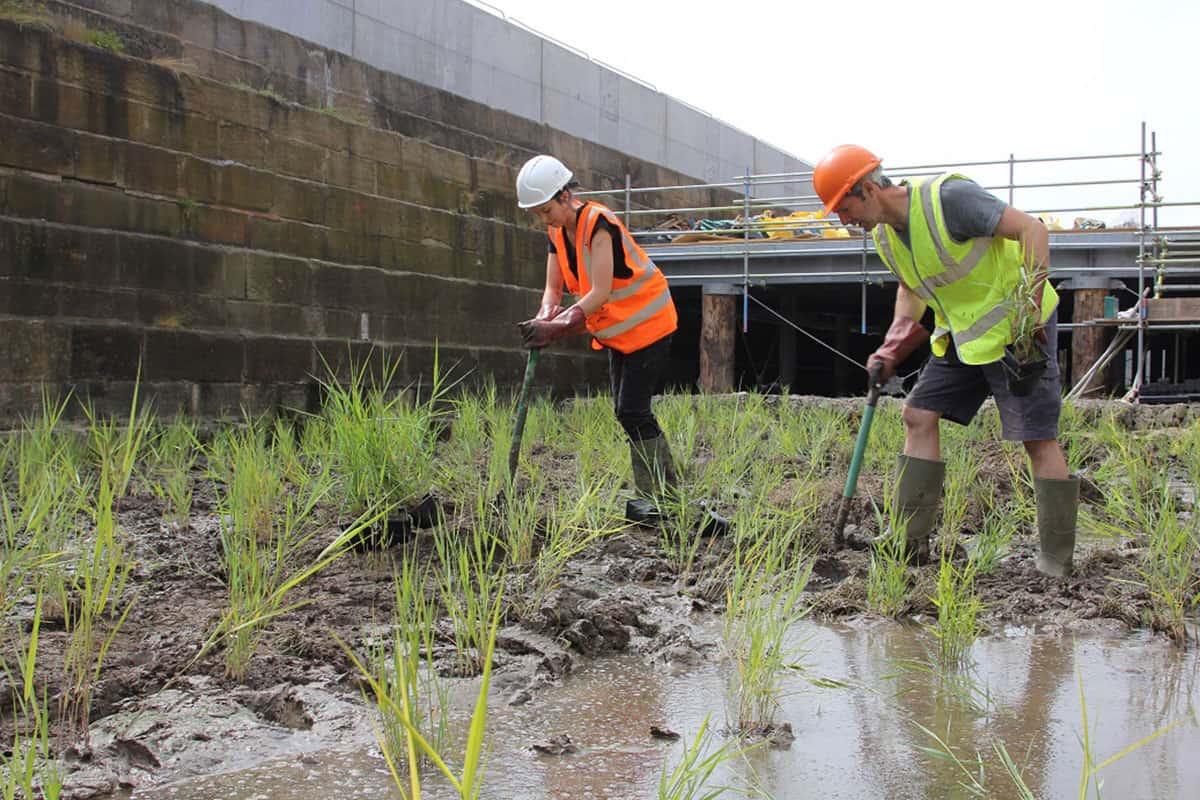A haven for wildlife has been created within Hull’s new open-air amphitheatre through a partnership between regeneration company Wykeland Group and the Yorkshire Wildlife Trust.
Hull-based Wykeland is investing £700,000 to create the 350-seat performance venue, named Stage @The Dock, in Hull’s Fruit Market cultural quarter.
Nearing completion, Stage @The Dock is a purpose-built venue for arts performances and events created within Hull’s Central Dry Dock with spectacular views of the River Hull, Humber estuary and The Deep.
Now, in the latest stage of the redevelopment of this long-neglected site, reed beds have been planted in the basin of the dock, either side of the stage and spectator seating.
A team from Yorkshire Wildlife Trust created the reed beds, planting approximately 1,500 Phragmites, a common UK reed that is native to and thrives in the Humber estuary.
Terry Smithson, Director of Operations North & East for the Yorkshire Wildlife Trust, said: “The rich and diverse culture of Hull has evolved through extremely close association with water, with the beautiful River Hull and the fabulous Humber Estuary.
“Lying at this confluence, Kingston upon Hull was founded over 700 years ago and it is heartening to see this link with water reformed through the introduction of reeds into the dry dock.
“A close link to the natural world is essential for our health and wellbeing and I am sure that the whisper of reeds, and perhaps a little bird song, will provide inspiration for those enjoying the amphitheatre.”
The reeds, supplied by North Cave-based Mires Beck Nurseries, are a familiar sight across wetlands in the UK and form important habitats for birds and other wildlife including Reed Warblers, Sedge Warblers, Reed Buntings and Wainscot Moths.
The tall, graceful stems of the Phragmites reed are easy to identify when packed together in a reedbed, producing large, dark purple feathery “spikelets” from late summer well into the winter months.
Also known as the Norfolk or Common Reed, this perennial grass is an excellent filtration plant which liberates oxygen through its spreading, creeping system of roots and is used extensively for water purification in industrial and commercial situations. A natural flood defence barrier, the reeds are often seen along river banks to prevent erosion.
Wykeland Project Manager Tom Cannon said: “The project to revitalise the dry dock has been both fascinating and challenging.
“We have brought a grade 2 listed structure back to life by the construction of the amphitheatre that cantilevers into it. Underneath we have assembled a very delicate ecosystem at the heart of which are 1,500 reed plants which should establish themselves in the silt as one complete growing organism.
“The challenge is balancing architecture, structural and civil engineering with horticulture and ecology. The planting of the reeds will create a natural habitat for wildlife, as well as adding to the attractiveness of the amphitheatre as both an area of public realm and an events venue.”
Yorkshire Wildlife Trust volunteer Chris Colley, one of the team who carried out the planting, said: “I live in Hull so it is great to work on something that will really benefit the city and enhance our urban spaces in readiness for the city of culture year.
“I feel really proud of what we have achieved here and I’m looking forward to seeing the reed bed once it’s established.”
Stage @TheDock will be managed and operated by Freedom Festival Arts Trust, the organisation behind Hull’s premier arts and culture event, and will provide a unique new platform for artists to perform. It will be the only new permanent venue created in the city before Hull’s year as the nation’s capital of culture and its development as a purpose-built arts arena is a key element of Wykeland’s contribution as a major partner of Hull UK City of Culture 2017.
The planting of the reedbeds coincided with the installation of a footbridge by Hull-based contractor, Hobson & Porter, giving access from Wykeland’s @TheDock development to the riverside walkway and bridge leading to The Deep.
Jayne Allen and Jon Traill from the Yorkshire Wildlife Trust digging in during reed planting at the new open-air amphitheatre which forms part of Wykeland’s @TheDock development.
Picture: Jess Charlton/Yorkshire Wildlife Trust.


